hankyoreh
Links to other country sites 다른 나라 사이트 링크
[100 days of candlelight] Activists say candlelight protests continuing to develop

“The changed nature of the candlelight demonstrations is disappointing, but they still continue.”
Major players in recent candlelight protests who met with The Hankyoreh expressed their fatigue and disappointment over the last 100 days, over the course of which they could not produce tangible changes. They stressed, however, that the demonstrations are not yet over. In in-depth interviews conducted by The Hankyoreh with 28 people including teenagers, the directors of online policy cafes and general cafe administrators, the leaders gave their diverse opinions on the last 100 days.
The thing to note in their answers was their judgment of the current situation, in which the demonstrations have tailed off. Some 13 respondents, almost half of the total 28, expressed a sense of defeat and disappointment. This was a very high number, twice as many as the five who said they felt new possibilities.
In particular, of the 11 teenagers interviewed, eight expressed disappointment, a very high ratio. The teens generally expressed disappointment about the slide of the candlelight demonstrations into violence. 18-year-old Kim Eun-jin, a senior at Yeongdong Girls High School in Bundang, Gyeonggi Province, said she was most disappointed in this transformation in the candlelight ceremonies, and the vigils should continue to stick to nonviolence like they did in the beginning.
When asked what they felt was most disappointing in the course of the demonstrations, the opinions proved most diverse. This showed that with the demonstrations still in progress, evaluations of the last 100 days could only differ. Ten of the 28 pointed to insufficient energy to keep the protests going, while six were disappointed that the protests could not stay peaceful to the end.
Nine gave different answers; one member of an SLR camera club who did not give his name said that demonstrators needed time to rekindle the cause after the protests had continued for a bit, but they could not.
“Sijipeu,” an administrator of the “Citizens Alliance Opposed to Policy,” said he was most disappointed that cracks in the group’s resolve began to appear due to the group’s inability to communicate opinions as the group began to work with outside Internet users.
Opinions differed, too, about the People’s Countermeasure Council against Mad Cow Disease, which led the candlelight protests. “Citizens Alliance Opposed to Policy” administrator Ahn Nuri, 37, said that the April 19, 1960 Revolution did not need leadership to work, but the candlelight protests had difficulty setting a direction due to the large number of Internet users and lack of political power and organization.
Gang Jeon-ho, the vice-head of an anti-Lee Myung-bak Internet cafe, said the candlelight demonstrations were produced by the People’s Countermeasure Council against Mad Cow Disease and Korean Internet users.
As opposed to their evaluation of the last 100 days, the interviewees were united in their opinions on where the protests should go from here and their significance. Some 24 of 28 respondents said the candlelight protests must continue. Only four said the protests should stop to give the government time. There was a split in opinion, 9 to 10, between those mainly involved in online policy cafes, who believed a minority should continue to resist to make their voices heard, and the teenager groups, who thought the demonstrators should organize more explosive protests after taking a breather. When asked about the significance of the protests, most said that, in reality, no major changes had taken place, but the protests are still continuing to develop.
Please direct questions or comments to [englishhani@hani.co.kr]
Editorial・opinion
![[Column] Season 2 of special prosecutor probe may be coming to Korea soon [Column] Season 2 of special prosecutor probe may be coming to Korea soon](https://flexible.img.hani.co.kr/flexible/normal/500/300/imgdb/original/2024/0426/3317141030699447.jpg) [Column] Season 2 of special prosecutor probe may be coming to Korea soon
[Column] Season 2 of special prosecutor probe may be coming to Korea soon![[Column] Park Geun-hye déjà vu in Yoon Suk-yeol [Column] Park Geun-hye déjà vu in Yoon Suk-yeol](https://flexible.img.hani.co.kr/flexible/normal/500/300/imgdb/original/2024/0424/651713945113788.jpg) [Column] Park Geun-hye déjà vu in Yoon Suk-yeol
[Column] Park Geun-hye déjà vu in Yoon Suk-yeol- [Editorial] New weight of N. Korea’s nuclear threats makes dialogue all the more urgent
- [Guest essay] The real reason Korea’s new right wants to dub Rhee a founding father
- [Column] ‘Choson’: Is it time we start referring to N. Korea in its own terms?
- [Editorial] Japan’s rewriting of history with Korea has gone too far
- [Column] The president’s questionable capacity for dialogue
- [Column] Are chaebol firms just pizza pies for families to divvy up as they please?
- [Column] Has Korea, too, crossed the Rubicon on China?
- [Correspondent’s column] In Japan’s alliance with US, echoes of its past alliances with UK
Most viewed articles
- 1‘We must say no’: Seoul defense chief on Korean, USFK involvement in hypothetical Taiwan crisis
- 2After election rout, Yoon’s left with 3 choices for dealing with the opposition
- 3AI is catching up with humans at a ‘shocking’ rate
- 4[Editorial] Korea’s surprise Q1 growth requires objective assessment, not blind fanfare
- 5Noting shared ‘values,’ Korea hints at passport-free travel with Japan
- 6Why Kim Jong-un is scrapping the term ‘Day of the Sun’ and toning down fanfare for predecessors
- 7Two factors that’ll decide if Korea’s economy keeps on its upward trend
- 8Amnesty notes ‘erosion’ of freedom of expression in Korea in annual human rights report
- 9The dream K-drama boyfriend stealing hearts and screens in Japan
- 10Yoon says collective action by doctors ‘shakes foundations of liberty and rule of law’